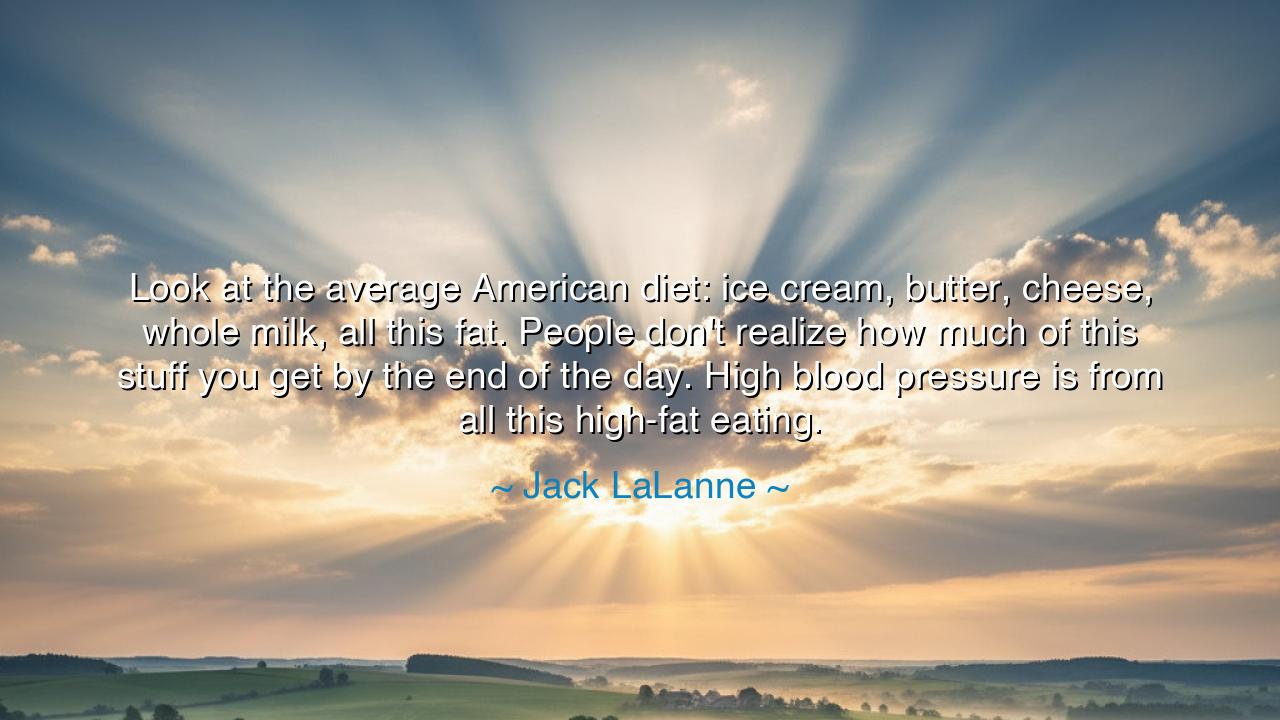
Look at the average American diet: ice cream, butter, cheese
Look at the average American diet: ice cream, butter, cheese, whole milk, all this fat. People don't realize how much of this stuff you get by the end of the day. High blood pressure is from all this high-fat eating.






In the words of Jack LaLanne, “Look at the average American diet: ice cream, butter, cheese, whole milk, all this fat. People don't realize how much of this stuff you get by the end of the day. High blood pressure is from all this high-fat eating,” we hear not a complaint, but a warning—a call from one who saw the decline of vigor in a nation that once prized strength. His words burn with the spirit of a prophet of health, a man who knew that the body is a sacred instrument, not a vessel for indulgence. In every syllable is the echo of an ancient truth: that gluttony dulls the will, clouds the mind, and slowly poisons the heart.
Long before the age of excess, the sages of the old world taught that discipline was the root of freedom. The great Spartans, whose bodies were temples of endurance, would eat only what sustained them and nothing more. They believed that the man who could not govern his appetite could not govern his life. LaLanne, too, was such a man—he rose before the dawn, trained when others slept, and treated food as medicine, not pleasure. He knew that what enters the mouth becomes the measure of one’s destiny, that indulgence is the first chain of weakness, and that the slow decay of health begins not in one meal, but in a lifetime of careless bites.
To speak of “ice cream, butter, cheese, whole milk” is not merely to name foods—it is to summon symbols of comfort turned into captivity. These are the gifts of nature corrupted by excess, the blessings of sustenance twisted into burdens. The ancient physicians would have called it imbalance—the loss of harmony between body and earth. For even the sweetest fruit, taken without restraint, becomes bitter to the spirit. And the high blood pressure LaLanne speaks of is not only the swelling of arteries but the swelling of desire itself, ungoverned and unrepentant.
History bears witness to this truth. In the waning days of Rome, the mighty empire that had conquered continents fell not by sword, but by the softness of its people. The Romans once marched on coarse bread and olives, their strength forged in simplicity. Yet as their tables filled with cream, wine, and roasted beasts, their spirit waned. Their vigor fled as indulgence took root, and the empire that ruled the world grew too weak to rule itself. LaLanne’s warning is the same: that comfort, when worshipped, becomes decay, and that nations, like men, perish when they mistake pleasure for power.
But there is redemption in his message. To reject excess is not to live in deprivation—it is to reclaim mastery over the self. The ancients taught the art of moderation as a path to enlightenment. In the East, the monks of Shaolin tempered their bodies and minds through discipline, eating only what was needed to sustain clarity and strength. Their lives were a testament to balance—to the union of mind and matter through mindful living. So too did LaLanne, a modern ascetic in a world of indulgence, embody the truth that discipline is liberation, and that to master the body is to master the soul.
The average diet, as he warns, is not merely food—it is habit, culture, surrender. When a man eats mindlessly, he forgets the sacred purpose of nourishment. He ceases to live with intention, and begins to live by appetite. Yet those who awaken, who see food as fuel and health as a calling, rise above the tide of decay. They do not bow to taste or craving, but walk the golden path of balance, where vitality burns bright and the spirit sings through the flesh.
Let this be the teaching handed down: eat not for comfort, but for life. Let every meal be an act of gratitude, not indulgence. Choose simplicity over excess, water over wine, strength over sloth. Beware the creeping poison of convenience, for what is easy often leads to ruin. Train the body, feed it with clean gifts of the earth, and it shall repay you with years of vigor and peace.
Thus, remember the wisdom of Jack LaLanne, the old warrior of wellness: the road to strength is not paved with pleasure, but with discipline, awareness, and respect for the body’s temple. The heart beats longer not because it is fed with richness, but because it is fed with restraint. Those who heed this will find not only longevity but clarity—the radiant health of body and spirit united in harmony, as the ancients once knew and the wise still remember.






AAdministratorAdministrator
Welcome, honored guests. Please leave a comment, we will respond soon